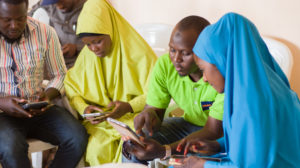Lessons From an Expert on Conflict Resolution
Sana Vaidya, Beyond Conflict Graduate FellowThis series explores the changing trends in the conflict resolution field over the past 30 years. In conversation with practitioners working across different contexts, we trace the evolution of thought that continues to shape the way forward. Vaidya spoke with Karen Bernstein, a civilian peacekeeper with extensive experience in conflict resolution.
“Conflict resolution is a long-term aim,” says Karen Bernstein, an experienced peacebuilder and advisor for Beyond Conflict’s Decoding Dehumanization project, an initiative focused on understanding the link between dehumanization and violence. From participating in United Nations Peacekeeping missions in Nepal and South Sudan to Alternative Dispute Resolution (ADR) in Northern Ireland, Bernstein’s rich experiences put her in a unique position to analyze how conflict resolution has evolved over the years.The first significant transformation Bernstein identifies is the increasing urgency to measure impact. More people are interested in knowing how their work affects situations and to what extent. “Funders, INGOs, and other leaders in the field have started paying more attention to this aspect”. It could be because conflict resolution indicators are not as straightforward or as easily identifiable as other fields and the evidence needed to measure indicators like stability, justice, and inclusivity is not uniform. In the months before the peace agreement in South Sudan, Bernstein recalls a number of indicators showing conflict dynamics getting worse. Since then, there have been multiple power-sharing peace agreements which have failed to stop the violence. She stresses that in order to predict how peace processes play out, there need to be indicators that better track changes on the ground so that actionable changes can be made for more lasting peace.

Secondly, Bernstein highlights the renewed efforts towards the United Nations’ goal to promote peaceful and inclusive societies. She advises that “it is an important time to think about our collective aim towards the creation of more peaceful societies and what they mean.” Strategic coordination and planning to measure progress has increased over the years. Multi-pronged collaborative approaches are important to treat wicked problems and reduce potentially disastrous consequences.
For Bernstein, the importance of strategic collaboration does not need to be stressed as much as the need to re-evaluate the crucial role of impact – an important guide in her own work. She thinks back to the time when she was the political advisor on the Middle East Peace Process for the British Government. As an advocate for policy changes in the ongoing Israel-Palestine conflict, she realized that data can be manipulated in many ways. Data can paint many different pictures based on who collects it, how it is interpreted, and the underlying interests behind it. It soon became apparent to Bernstein that strong design and rigorous data collection can strengthen assertions for policy recommendations. Robust data could effectively limit the ability of the other party to find faults in the information being presented. This was also when she realized she wanted to engage in this work differently, leading her to Beyond Conflict.
“It takes a long time to change perceptions and create behavioral change. Any small or fragile situation can hamper that and lead to an eruption of violence. I wanted to find a project that would understand what it was able to accomplish before it was built on a large scale,” says Bernstein of her work with Beyond Conflict. She currently researches interventions to reduce conflict in Nigeria between Christian and Muslim communities along with Dr. Rebecca Littman, Beyond Conflict’s lead researcher on the project. This project uses randomized control trials to identify specific factors that are impactful and can be used to create larger science-informed, evidence-based interventions.
“More funders [of this work] should be asking difficult questions,” adds Bernstein, who supports the increased attention towards methodology and indicators. In her experience, current Monitoring and Evaluation (M&E) systems do not fully serve their purpose. Focus group discussions and surveys used to substantiate impact are neither comprehensive nor conclusive enough. The many factors present in an active conflict make it difficult to pinpoint and address all of them. Spaces for civil society, inclusive economic development and safeguarding the interests of all people are essential to create long-term peace and development.
The importance of rigorous methodology and best practices are slowly coming to the forefront. Stakeholders at all levels are beginning to question methods of data collection and verification in situations where ‘do no harm’ is only the beginning.
“The goal,” she concludes, “is to challenge perceptions and create space where peace does succeed.”
Karen Bernstein is Beyond Conflict’s advisor on the Decoding Dehumanization Project. She has worked in entrenched violent conflict and post-conflict reconstruction contexts, specifically in Israel/OPT, Cambodia, Nepal, US, Ireland/Northern Ireland and South Sudan. Karen is a Rotary World Peace Scholar and the runner-up winner of the FCO’s Sir Nick Brewn Policy Excellence Award in 2015.
Sana Vaidya is a Beyond Conflict Graduate Fellow, and current master’s student in Conflict Resolution at Georgetown University, pursuing a certificate in Refugees and Humanitarian Emergencies.